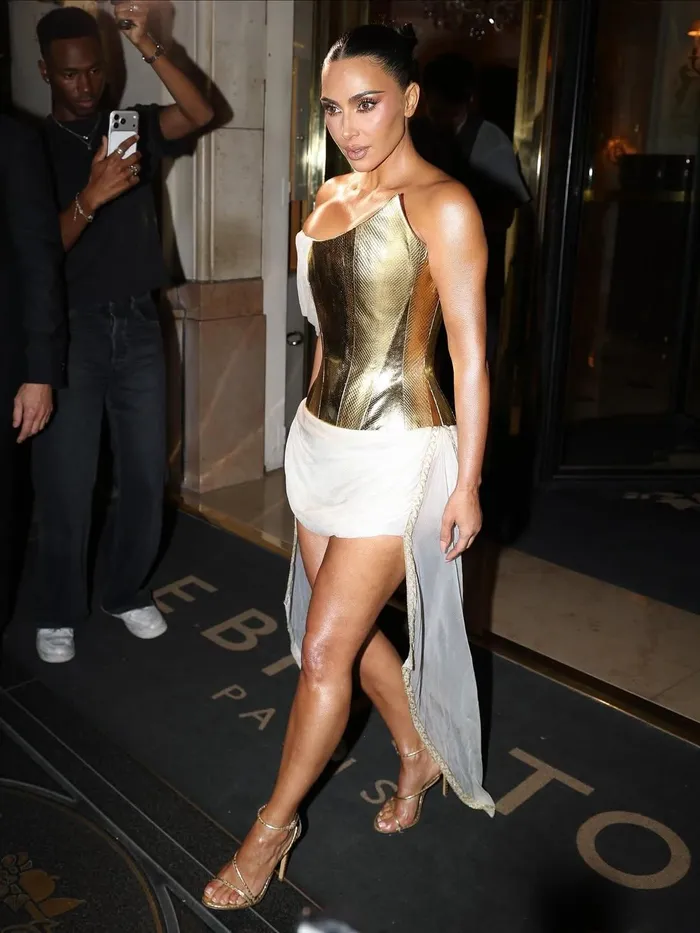Kim Kardashian blames ChatGPT for failing her law exams

Instagram/Kim Kardashian in archival Givenchy from the SS1997 Haute Couture collection designed by Alexander Mcqueen
Image: Instagram
Kim Kardashian has never been shy about letting the world in on her personal growth, from being a beauty mogul to a reality star turned aspiring lawyer.
But her latest confession might hit closer to home for anyone who’s ever relied on technology a little too much. In a recent "Vanity Fair" lie detector interview, Kardashian admitted to having what she called a “toxic relationship” with ChatGPT, blaming the AI chatbot for making her fail a law exam.
“I’ll take a picture, snap it and put it in there,” she said, explaining how she often turns to ChatGPT for legal help. “It has made me fail tests… all the time. Then I’ll get mad and yell at it.”
The 45-year-old star, who’s been open about her years-long journey toward becoming a lawyer, confessed that the AI tool has been both a helper and a hindrance.
“They need to do better,” she joked. “Because I’m leaning on them to really help me, and then they become my therapist after giving me the wrong answer.”
Her co-star, musician Teyana Taylor, teasingly asked if that made ChatGPT a friend. “No,” Kardashian replied with a smirk and responded: “a frenemy.” The lie detector confirmed she was telling the truth.
Yet, beneath the humour of her comments is a larger discussion, one that goes far beyond Hollywood. Kardashian’s experience highlights how deeply artificial intelligence is woven into our everyday lives, from social media filters to smart assistants and now education.
The AI dependence dilemma
While AI tools like ChatGPT have become everyday companions, especially for students and professionals, experts warn of the growing dependency on them.
According to a 2024 Stanford University study on generative AI in education, over 68% of students admitted to using AI tools to complete assignments, with many relying on them for research and explanations.

Kim Kardashian admits to a toxic relationship with ChatGPT in latest confession
Image: Instagram
However, only a fraction verified the information’s accuracy, raising questions about critical thinking and intellectual independence. To address this, experts recommend a few simple strategies to verify AI-generated information.
For instance, cross-referencing AI outputs with reliable sources or using the information as a starting point rather than a conclusive answer can significantly enhance accuracy. This proactive approach not only improves the reliability of the data but also sharpens one’s analytical skills.
Dr Kate Darling, a researcher at the MIT Media Lab, explains that while AI can “amplify learning,” it can also “erode the ability to question and engage with knowledge critically.”
In other words, relying on AI without understanding can create a false sense of competence, something even a celebrity like Kardashian isn’t immune to.
Kardashian’s admission may sound humorous, but it mirrors a global trend: people trusting AI more than they trust themselves.
From university students using ChatGPT to write essays to professionals seeking career advice from AI, we’re entering an era where technology not only assists us but also advises us.
But as she found out, even the smartest algorithms get things wrong. A 2023 Nature study found that while generative AI tools perform impressively in simulated tests, their factual accuracy often falls below 80%.
That means one in five answers can be misleading or incorrect, especially in fields requiring precision, like law or medicine.
Kardashian’s “frenemy” dynamic with ChatGPT perfectly captures our current relationship with technology, part admiration, part frustration. It’s the same love-hate connection many of us share when Google Maps leads us astray or autocorrect changes our meaning completely.
For Kardashian, whose late father Robert Kardashian was a celebrated attorney, her law pursuit has been deeply personal. She’s been studying since 2019, famously failing the “baby bar” three times before passing in 2021.
Her persistence is admirable, and her willingness to admit mistakes, even those involving AI, is a refreshing reminder that technology isn’t a shortcut to mastery.
Related Topics: